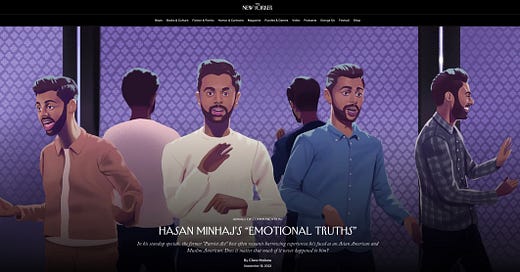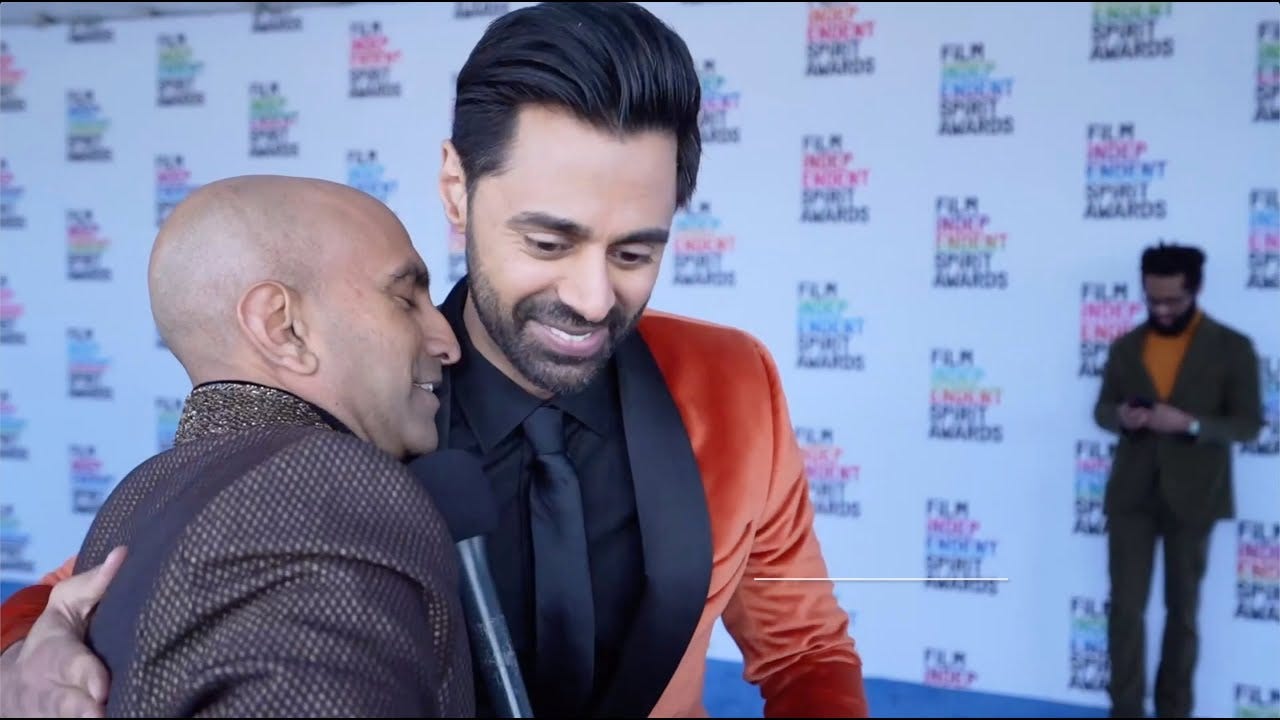UPDATE — 9/20/23, 7:52 PM PT: Hasan Minhaj and I exchanged texts, an email, and a phone call this evening. I've deleted my Facebook post but Hasan just gave me his blessing for me to send this out, given that I wrote this caveat you are now reading. He did not insist on approving the language and I appreciate his trust in how I word this. Suffice it to say that there's a lot more to this story; I won't say more so as not to betray his confidence, but for now, I'm inclined to give him the benefit of the doubt. As such, this might all end up being an academic discussion, but it’s a fascinating and important one nonetheless. I stand by what I wrote below IF everything is true as reported. But he shared enough evidence that it doesn't feel right to keep it up without this paragraph. I want to see how this unfolds before and if I provide any further thoughts. I will say that I'm proud of myself for striking the balance between professional critique and personal friendship. And I'm even more proud of — and humbled by — Hasan's phone call and understanding. I think it speaks volumes about his character that he took the time to speak to an old friend. And I thank you, dear readers, for YOUR understanding and support. Here goes.
Last week, The New Yorker ran a piece with the subtitle:
In his standup specials, the former “Patriot Act” host often recounts harrowing experiences he’s faced as an Asian American and Muslim American. Does it matter that much of it never happened to him?
Last night, Hasan came over and we talked about it for 12 hours and I asked him if it's OK that I just made that up and he said, "Of course. That's what I do."
Kidding. OK, so the rest of this is my real reaction. Here goes...
First of all, I cannot recall receiving more messages about a story in a long time. That's to be expected: it's in my standup act that Hasan Minhaj lived with me in Studio City, CA, for two years. I attended his wedding; we're still good friends. I mean, the peak has to be Siri Grandhe's 2007 graduation party.
ANYway, a few weeks ago when I posted...
... Hasan called me and we caught up for 45 minutes. When The New Yorker news broke, he and I exchanged texts immediately. I offered him my support as a friend.
Anyone who's known me since high school might know that I've long said, "I'm loyal to people but I'm more loyal to principles." That stance has ensured I traded respect for popularity, a trade that has sometimes hurt me emotionally in the short term but always rewarded me reputationally in the long term.
So, as a comic, here's that principled take. I remain hesitant to share it, not only because of our friendship but also because I do feel the media seem to have it in for People of Color. I’m no fan of comedian Aziz Ansari’s, but the day the news broke of his alleged sexual misconduct, even Russell Peters called me to commiserate about how what was happening to him wasn't fair. Aziz is a heel and perhaps the hit he took was simply a Douche Tax. But most people to whom I've spoken do not believe he should've become so toxic overnight for what appeared to be a bad date.
Naturally, most people assume that most comedians embellish. For the record, I don't do it that much. So, when I unspool this vignette…
If you’re gonna date a model, you’d better have a killer line. And one night, I did. I was chatting this woman up at a bar and she got annoyed and said, “I have a serious boyfriend.” I said, “Yeah? You need a funny one.” Boom.
...that really did happen.
Now, that line appears in my bit about LA models. Was she actually a model? I honestly don't remember. It was a long time ago. I do remember she was pretty. And in that example, the crowd doesn't care if I actually said it or even if she was a model. After all, it's a light story with no real-world consequences.
But Minhaj won a Peabody Award for Hasan Minhaj: Homecoming King. Comedians don't win Peabodys...(Is it Peabodies? Or is it Peebody? No, that's what R.Kelly won.) I'll start over.
Comedians don't win Peabodys for hilarious comedy sets. They win them for, well, here's the main quote on their site:
"𝐏𝐞𝐚𝐛𝐨𝐝𝐲 𝐀𝐰𝐚𝐫𝐝𝐬 𝐡𝐨𝐧𝐨𝐫𝐬 𝐞𝐱𝐜𝐞𝐥𝐥𝐞𝐧𝐜𝐞 𝐢𝐧 𝐬𝐭𝐨𝐫𝐲𝐭𝐞𝐥𝐥𝐢𝐧𝐠 𝐭𝐡𝐚𝐭 𝐫𝐞𝐟𝐥𝐞𝐜𝐭𝐬 𝐭𝐡𝐞 𝐬𝐨𝐜𝐢𝐚𝐥 𝐢𝐬𝐬𝐮𝐞𝐬 𝐚𝐧𝐝 𝐭𝐡𝐞 𝐞𝐦𝐞𝐫𝐠𝐢𝐧𝐠 𝐯𝐨𝐢𝐜𝐞𝐬 𝐨𝐟 𝐨𝐮𝐫 𝐝𝐚𝐲."
Most comedians are clowns. They're not making any higher point and honestly I don't think most of them are clever or wise enough to do so. This is why context is important. Minhaj IS clever and wise enough to reach that holy grail of comedy: hilarious and insightful stuff that does indeed change people's minds.
A one-person show isn't a Haunted House. As someone who's assembled two of them (solo shows, not haunted houses), I can tell you a solo show like Homecoming King (2017) and The King's Jester (2022) is a vehicle developed to sit between a live play and standup comedy: it's to introduce some earnestness to your set so the expectation isn't nonstop laughter. Ironically, the abstract for my 2016 TEDx Talk, "The Jester Is King" read:
𝘈𝘳𝘦 𝘤𝘰𝘮𝘦𝘥𝘪𝘢𝘯𝘴 𝘯𝘰𝘸 𝘴𝘰𝘤𝘪𝘦𝘵𝘺’𝘴 𝘮𝘰𝘴𝘵 𝘵𝘳𝘶𝘴𝘵𝘦𝘥 𝘵𝘳𝘶𝘵𝘩-𝘵𝘦𝘭𝘭𝘦𝘳𝘴? 𝘐𝘯 𝘰𝘭𝘥𝘦𝘯 𝘵𝘪𝘮𝘦𝘴, 𝘵𝘩𝘦 𝘳𝘰𝘭𝘦 𝘰𝘧 𝘵𝘩𝘦 𝘤𝘰𝘶𝘳𝘵 𝘫𝘦𝘴𝘵𝘦𝘳 𝘸𝘢𝘴 𝘵𝘰 𝘤𝘰𝘯𝘷𝘦𝘺 𝘵𝘳𝘶𝘵𝘩𝘴 𝘵𝘰 𝘵𝘩𝘦 𝘒𝘪𝘯𝘨 𝘸𝘪𝘵𝘩𝘰𝘶𝘵 𝘧𝘦𝘢𝘳 𝘰𝘧 𝘳𝘦𝘵𝘳𝘪𝘣𝘶𝘵𝘪𝘰𝘯. 𝘛𝘰𝘥𝘢𝘺, 𝘰𝘩, 𝘩𝘰𝘸 𝘰𝘶𝘳 𝘒𝘪𝘯𝘨𝘴 𝘩𝘢𝘷𝘦 𝘧𝘢𝘭𝘭𝘦𝘯: 𝘵𝘩𝘦 𝘨𝘰𝘷𝘦𝘳𝘯𝘮𝘦𝘯𝘵, 𝘵𝘩𝘦 𝘮𝘦𝘥𝘪𝘢, 𝘵𝘩𝘦 𝘤𝘩𝘶𝘳𝘤𝘩, 𝘵𝘩𝘦 𝘣𝘶𝘴𝘪𝘯𝘦𝘴𝘴 𝘸𝘰𝘳𝘭𝘥 - 𝘸𝘩𝘰 𝘰𝘱𝘦𝘳𝘢𝘵𝘦𝘴 𝘸𝘪𝘵𝘩 𝘤𝘳𝘦𝘥𝘪𝘣𝘪𝘭𝘪𝘵𝘺 𝘢𝘯𝘺𝘮𝘰𝘳𝘦? 𝘈𝘳𝘦 𝘤𝘰𝘮𝘦𝘥𝘪𝘢𝘯𝘴 𝘵𝘩𝘦 𝘭𝘢𝘴𝘵 𝘰𝘯𝘦𝘴 𝘴𝘵𝘢𝘯𝘥𝘪𝘯𝘨?
As comedians' standing has indeed risen this century, it is part of our social contract to be clearer when we're joking and when we're not. And it's become a common refrain for entertainers to say, "Hey, I'm playing a CHARACTER named 'Andrew Dice Clay.'" No. It's fine if it's obviously a conjured-up persona. But we can't all use that as a shield to mask all of our behavior. If it’s not clear that it’s a character AND your tone is earnest, then the audience would rightfully believe you. They’d believe you for the same reason that comedians often get heckled while actors in plays (during which we suspend disbelief) often do not: you’re talking directly to me, human-to-human.
When Variety posted the story, what seemed like the vast majority of the comments mocked the post, writing, "Whoa... real breaking news there. Comedians make up their jokes?!" That sort of simple take is usually written by people who skimmed the headline.
We all have a different approach to comedy. Some of us are Class Clowns with a Mic. Others are Philosophers with a Mic. And still others are Activists with a Mic. Minhaj has built his entire career on activism, on speaking truth to power. He won a Peabody Award for social justice*.
Making up a story about how you scored with a woman at a bar is one thing. That's in the name of comedy. Saying someone mailed anthrax to your house and some spilled on your daughter and she had to be rushed to the hospital is quite another thing. That's not funny nor was it intended to be. It's a story in service of a greater narrative.

A perfectly apt question is: "Who cares? You're totally overanalyzing this, dude." Well, overanalysis is what I do. But this isn't about me. It's about us.
And by us, I mean underserved communities that struggle to be believed: women, PoC, queer, Hindus, Muslims, et al. Representation is a right but it's also a responsibility. When it was revealed that the alleged rape at the center of the 2006 Duke Lacrosse Case was a fabrication, it set the women's movement back. And when a South Asian's stories turn out to be untrue, it can have a similar effect. So, to answer The New Yorker’s question: “Does it matter?” Yes. This is why it does. I truly hope this leads to a greater dialogue about truth, honesty, and what's fair in the battle for equal rights.
It’s all art. There can be more than one interpretation. And again, I ask you to withhold judgment till we hear his side of the story. For me personally, I can tell you Hasan has consistently been kind to me. And in an Industry in which so many people blow up and change, he’s still the same dude he’s always been. And I deeply admire him for it. If I had to give you one piece of advice, my guy, it'd be this:
𝗜 𝗗𝗢𝗡'𝗧 𝗠𝗜𝗡𝗗 𝗜𝗙 𝗬𝗢𝗨 𝗣𝗟𝗔𝗬 𝗠𝗘 𝗙𝗢𝗥 𝗟𝗔𝗨𝗚𝗛𝗦.
𝗝𝗨𝗦𝗧 𝗗𝗢𝗡'𝗧 𝗣𝗟𝗔𝗬 𝗠𝗘 𝗙𝗢𝗥 𝗧𝗘𝗔𝗥𝗦.
𝘙𝘢𝘫𝘪𝘷 𝘚𝘢𝘵𝘺𝘢𝘭 𝘪𝘴 𝘢 𝘤𝘰𝘮𝘦𝘥𝘪𝘢𝘯 𝘢𝘯𝘥 𝘸𝘪𝘭𝘭 𝘴𝘵𝘢𝘯𝘥 𝘣𝘺 𝘩𝘪𝘴 𝘧𝘳𝘪𝘦𝘯𝘥, 𝘏𝘢𝘴𝘢𝘯 𝘔𝘪𝘯𝘩𝘢𝘫, 𝘧𝘰𝘳 𝘵𝘩𝘦 𝘺𝘦𝘢𝘳𝘴 𝘰𝘧 𝘤𝘰𝘯𝘷𝘦𝘳𝘴𝘢𝘵𝘪𝘰𝘯𝘴, 𝘴𝘵𝘳𝘶𝘨𝘨𝘭𝘦𝘴, 𝘢𝘯𝘥 𝘭𝘢𝘶𝘨𝘩𝘴 — 𝘢𝘭𝘭 𝘰𝘧 𝘸𝘩𝘪𝘤𝘩 𝘩𝘢𝘷𝘦 𝘣𝘦𝘦𝘯 𝘳𝘦𝘢𝘭.
#hasanminhaj #indiancomedy








Really appreciate this nuanced yet clear take on the situation. Hasan’s brand has been (or maybe become) truth telling - whether about the experience of Brown kids of immigrants or about the workings of government and society. Like you said, those of us on the margins already have difficulty being heard and believed - on the other hand, it’s a heavy burden to carry the weight of so many communities and not be granted the same grace to slip and fall that non marginalized communities have. Will continue to support him and also keep pushing for better! Thanks for this one.
There’s a paradigm shift happening it started with Hannah Gasby’s Nanette. This business with Hasan I feel is part of that shift. Comedy is changing wonder how we as comic will navigate this change of what will make the populist laugh. With the emergence of more neurodivergent people coming to terms with their ADHD and Autism. I’m both newly diagnosed last year. We’re literally thinkers everything that comes out of your mouth we take as truth. Masking as a Neurotypical for 43 yrs and integrating this new information has not been easy. Generally humor goes over our heads. We don’t get jokes. Generally, but the jokes we get is just different. I think humor is just shifting. How do we make a more neurodivergent population laugh now?